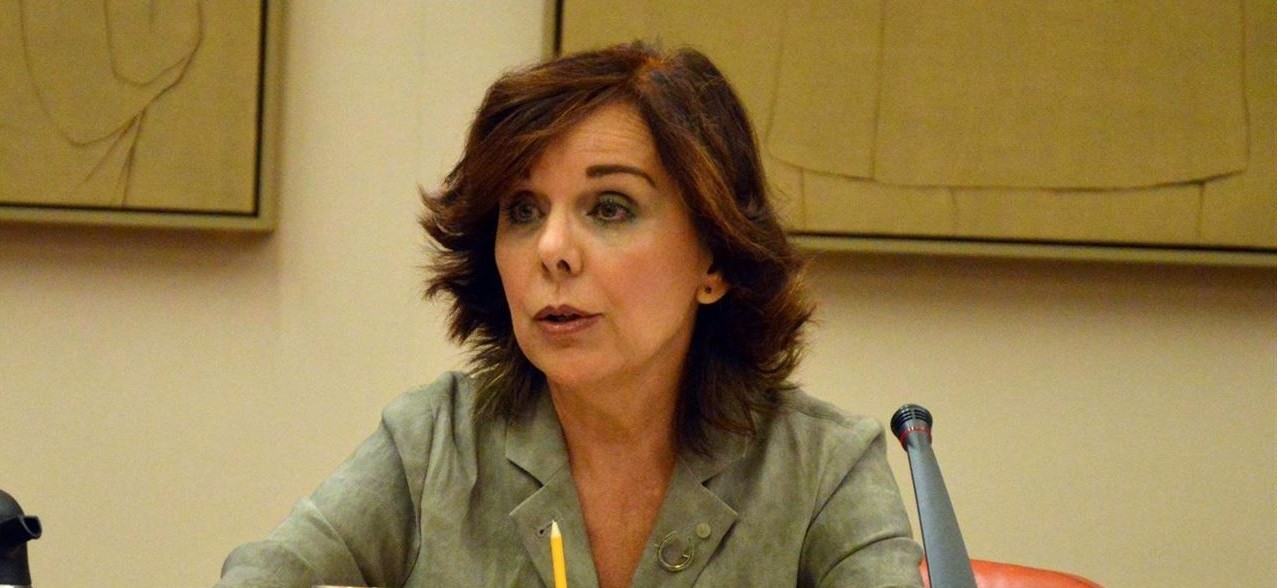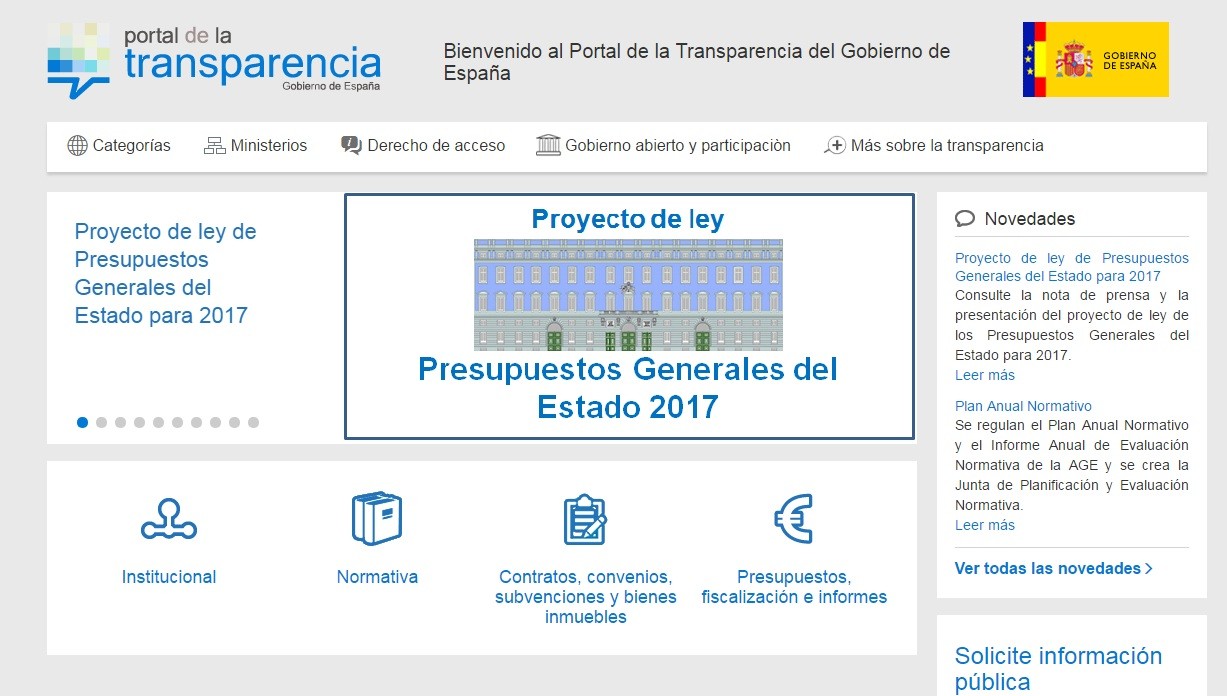
Interview | Esther Arizmendi: "Undesirable behaviours have greatly undermined the confidence of the general public in their institutions"
Carmen P. Flores
Esther Arizmendi, president of the Transparency and Good Governance Council, was appointed by the Council of Ministers in December 2014, after obtaining the support, by an absolute majority, of the Treasury and Public Administration Committee of the Congress of Members of Parliament.
The body she chairs was born of the Transparency Law, passed in 2013. Her role is complex, but she, as she has been demonstrating in the time that she has been in the postion, is a woman with quite clear ideas.

What is the Transparency and Good Governance Council?
The Transparency and Good Governance Council is the independent body that was created as a result of Law 19/2013 of transparency, access to public information and good governance, to monitor compliance with this law. The Council is also an agency that has to promote the change of culture. Data and information become the property, not of the Administration, which remains as a mere depository, but rather to be of the general public, leaving the public authorities to be held accountable through the transparency of their activity.
What is it for?
According to the preamble of the Law, it serves to subject the actions of public civil servants to scrutiny, to know how decisions are made, how public funds are handled, under what criteria institutions act and opening up a more participatory democracy. Moreover, it also serves as an element of training of a more critical, better informed and more demanding society, all of which will act as a preventive element of undesirable actions that have always taken refuge in opacity.
Is transparency the great subject pending in Spain?
Fortunately, in 2013 a long-awaited law was passed after 40 years of democracy. At this moment, the speed at which the introduction of transparency in Spain has to advance the implementation, which needs an added effort to put ourselves in the same position as the rest of the European countries in terms of the right to know.
The response of the administrations has been good and we can say that the first level of transparency has been fulfilled. Two years is a more than reasonable deadline.
Changing the mentality is the most complex, since neither organisations are accustomed to sharing openly, nor the general public accustomed to ask without fear.
Do you think transparency is not worth the paper it is written on?
If I believed that, I would not get up every morning with the enthusiasm or the commitment that our Administration and our society are changing.
Progress has been noteworthy. Now we can inform ourselves about all the budget and economic information, contracts made, agreements, grants, management fees, grants, scholarships..., managed by the Administration. We can also follow the development of laws and understand how an administrative organization is internally, and also what is not given to us ex officio can be asked for, and the Administration is obliged to respond within a month, after which, the Transparency Council will defend to the end the right to obtain public information.
I sincerely believe that today a society measures its democratic quality by the level of dialogue and openness to the general public, and this is called: transparency, open government and citizen participation.
Why is it so difficult for administrations to inform the general public and be more transparent?

During many year, the administrations associated information with power, and consequently, they did not share it. As I said before, changes in mentality are the most complex. The Administration felt comfortable in its traditional position and, in big organisations, changes are always quite complicated.
However, they are becoming used to the idea that they have to be vectors of transparency in their capacity as public servants and increasingly, the idea that the right of access is a way of serving the general interest, specifically a subjective, substantive, public and universal right that has led to the creation of this law.
Are Spanish institutions transparent?
Soon, the Council is going to the first edition of the transparency ranking of the constitutional organs and of constitutional relevance with a methodology of its own.
The level of transparency of the agencies is quite different. The constitutional and independent bodies have an extraordinary commitment to transparency in their organization, which has been a great news for the Council, which has been able to verify that the greater the independence, the greater the transparency.
As for the General State Administration, the variety of agencies leads to different levels of transparency. The Council considers that there is room for improvement, especially in the quality of information, although the work of the information units of all agencies, which are responding in a timely manner to the demands of the general public, has to be positively valued.
Are elected civil servants accountable for their contacts, meetings, and agendas?
Although state law does not oblige it, there are many laws at Autonomous Region level that have considered it mandatory in the matter of active publicity. The Council has always considered public money to be accountable, but also public time, in that spirit signed a joint approach with the Spanish Agency for Data Protection, which will soon lead to a recommendation on how should be the diaries for transparency. In short, we believe that diaries should also be mandatory.
Has society become more demanding or not?
Society is quite broad and complex. On one hand, it has become more demanding and also more diverse; but on the other, undesirable behaviour has greatly undermined the confidence of the general public in their institutions and there is a certain level of saturation and disaffection that has to be recovered through concrete actions. We believe that transparency will help to legitimize the public function, and we are working towards this.
What do you think about revolving doors?
Any privileged situation involving public elements is contrary to the norms of good government and public ethics.

How should the relations of public and political powers with lobbies be?
They have to be transparent. Almost all political parties have included the regulation of lobbies in Spain in their programmes at the last elections.
The Transparency Council supports this initiative and also some bodies such as the National Commission on Markets and Competition (CNMC) or the Madrid City Council, are already operating with lobbies registers in their area of competence. Some Autonomous Regions have also included it in their laws. It would be a shame if the Autonomous Regions ended up displaying more transparency than the State. That is why we believe that the law of transparency is called to reinvent itself and develop itself continuously, because transparency cannot put its feet under the table, nor remain stagnant, but has to develop and the State Administration has to be exemplary in this progression.
Is Justice transparent?
If we believe that the courts are not independent and that they do not solve cases only according to law and right, then we would be facing absolute bankruptcy, not only in the division of powers but also in the rule of law. And that would be a quite serious situation.
How would you rate the time you have in charge of the Council?
For me it is being an extraordinary experience. It is the first time in my 34 years of professional career in which I have led the implementation of an independent, relevant body, called on to be the axis of public activity, starting from nothing.
It is a frantic, creative, committed, exciting activity that led Confucius to say: "Find a job that you like, and you will not feel as if you are going to work even a single day of your life".









